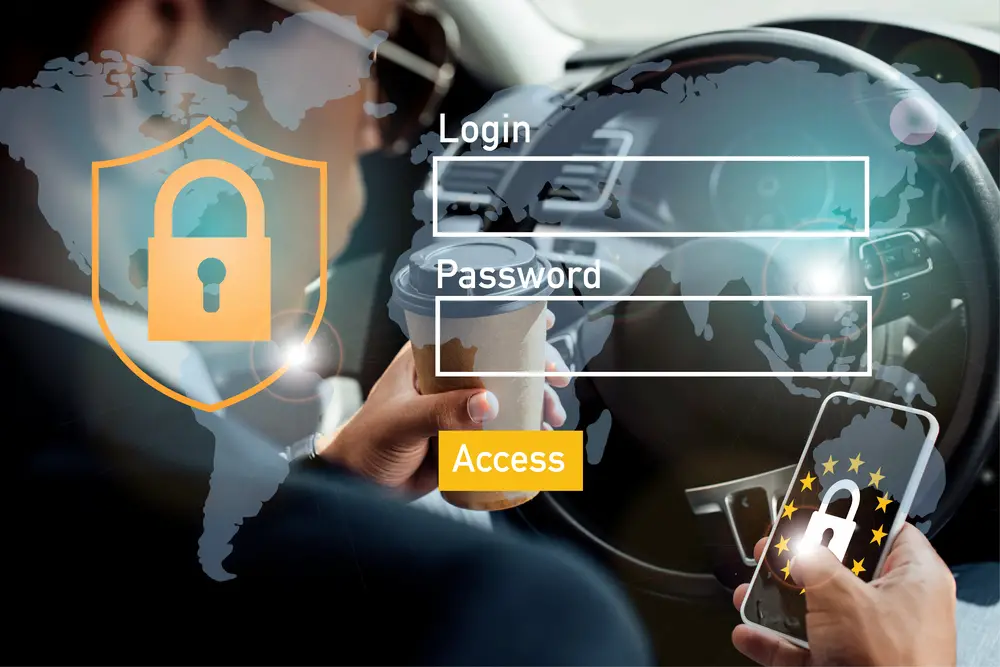Click here to get this post in PDF
The rise of the “work from anywhere” culture is transforming people’s work behaviour. From digital nomads to freelancers, contractors to full-time employees who work in a myriad of locations, none of these workers are tethered to a desk, and all of them use the internet and technology to work from anywhere. Whether it’s a beachside café in Bali, a co-working space in Berlin, or an airport in Dubai, all you need is a laptop and an internet connection.
But with this newfound freedom comes the need for heightened online security. Public Wi-Fi, unsecured networks, and data theft are just a few of the risks that can jeopardise both your personal and professional life. The fact is that working online is becoming increasingly dangerous. It’s essential to browse consciously – check that websites look and feel reliable, check your privacy settings, steer clear of links from untrusted sources (spam emails, unsolicited ads, and clickbait), and avoid risky shopping or banking transactions on public Wi-Fi. All of these things can expose your personal data or infect your device with malware. If you receive an email you’re unsure about, avoid clicking any links or opening attachments. It’s often safer to ignore untrusted emails altogether. When in doubt, go directly to the source—if a bank email seems off, call your bank to verify it. Always ensure that links take you to the content you expect; if a link on a travel site suddenly directs you to a celebrity gossip page, close it immediately.
Be mindful of what you post online. It’s all too easy for digital nomads or full-time employees working in exotic locations to get caught up in sharing their travels online. However, oversharing can unintentionally put you at risk. Posting your location in real-time or sharing too much personal information can make you a target for scams or identity theft. Always be mindful of your digital footprint and consider waiting until you’ve left a location to share photos or updates.
Consider these seven must-know tips to keep you safe online while working remotely:
1. Beware of Public Wi-Fi Risks
Public Wi-Fi networks are often unsecured, making them a prime target for hackers looking to steal sensitive information. These networks can allow cybercriminals to “eavesdrop” on your activity, intercept login credentials, and access confidential business data. While it’s tempting to log on to that free Wi-Fi at the local café or airport, doing so without taking precautions can expose you to serious risks.
2. Use a VPN
One of the best ways to stay safe when using public Wi-Fi is to invest in a Virtual Private Network (VPN). A VPN encrypts your internet connection, making it much harder for hackers to intercept your data. It essentially creates a secure “tunnel” for your information to pass through, ensuring that even if you’re on a public network, your activity remains private. Many remote workers consider a VPN an absolute must-have tool for staying safe on the road.
3. Enable Two-Factor Authentication (2FA)
Even with a strong password, your accounts are still vulnerable if someone manages to gain access to your login details. Two-factor authentication (2FA) adds an extra layer of security by requiring a second form of verification—usually a code sent to your mobile device—before allowing access to an account. This makes it significantly harder for cybercriminals to gain unauthorised access.
4. Keep Your Software and Devices Updated
Keeping your devices up to date is essential for security. Software updates often contain critical security patches that protect you from the latest threats. Many hackers exploit vulnerabilities in outdated software to gain access to devices and data. Whether it’s your Mac operating system, browser, or antivirus program, make sure you’re using the latest version to stay protected.
5. Secure Your Passwords
Weak passwords are an easy target for cybercriminals. Instead of using easily guessable combinations like “password123,” opt for strong, unique passwords for each of your accounts. Better yet, use a password manager to create and store complex passwords. A password manager not only helps you avoid reusing passwords across multiple platforms, but it also keeps track of your credentials securely.
6. Use a Good Antivirus and Update it Regularly
Alongside safe online habits, using a high-quality antivirus provider is critical for protecting yourself in today’s digital landscape. Internet security software acts as your first line of defense, shielding your devices and data from common threats like viruses and malware, as well as more complex dangers such as spy apps, cryptolockers, and XSS attacks. A robust antivirus actively blocks these threats before they can compromise your system. But remember, even the best antivirus is only as good as its most recent update. Keeping it regularly updated ensures you’re equipped to stay ahead of evolving cyber threats, offering peace of mind as you work and browse online.
7. Back Up Your Data Regularly
Whether you’re working on client projects, sensitive business documents, or personal files, regularly backing up your data is critical. In the event that your laptop is lost, stolen, or compromised, having a recent backup means you won’t lose everything. Cloud storage options, such as Google Drive, Dropbox, or OneDrive, provide an easy and secure way to store your important files. Just make sure to enable encryption for an extra layer of protection.
Enjoy the Best of Both Worlds with the Best Antivirus Software Providers
Nomadic working offers fun and freedom, but with this freedom comes the responsibility to protect yourself online. By understanding the risks and taking proactive measures—like using a VPN, enabling 2FA, having the right internet security software and keeping your devices updated—you can enjoy the best of both worlds: the thrill of working from anywhere and the peace of mind that comes with knowing your data is secure.
At the end of the day, whether working from a bustling airport or a remote beach, your focus should be on enjoying the freedom and adventure of not being tied to your desk, not stressing over the constant threat of being hacked or scammed. With trusted software such as Norton antivirus doing the tedious work for you, you can protect your data and devices effortlessly. Let the experts worry about blocking viruses and malware, while you focus on your work and enjoy the perks of the digitally remote lifestyle.
Have fun, stay safe, and let your internet security do the heavy lifting.
You may also: 7 Common Cybersecurity Mistakes Organizations Make
Image source: DepositPhotos.com


